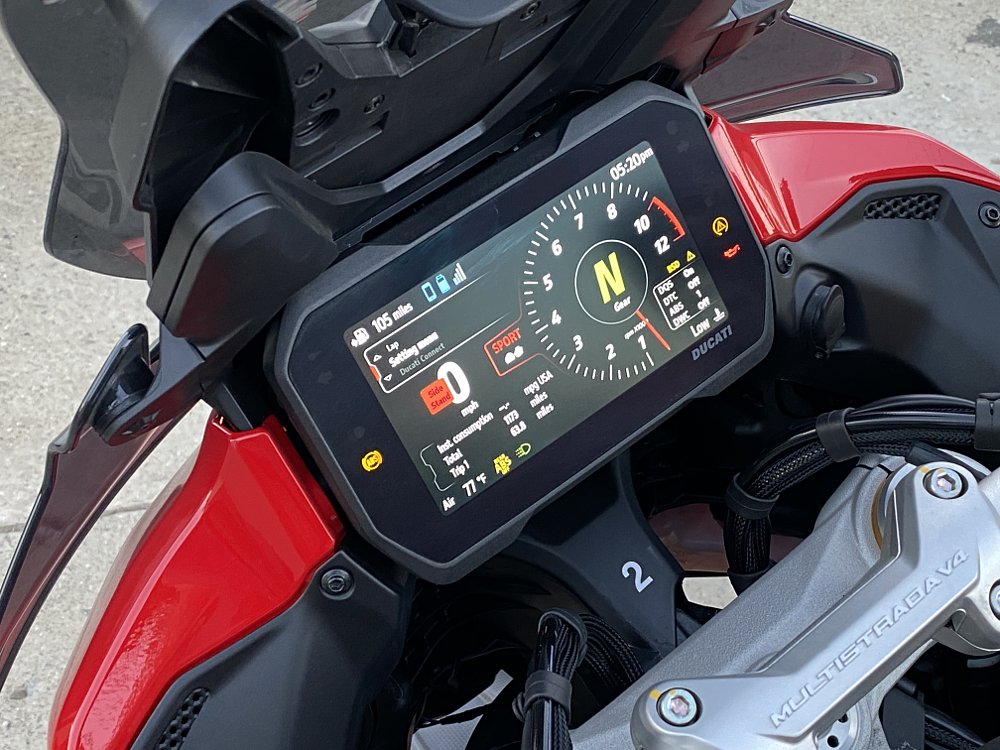About this time last year, Zack got his hands on a spankin’ new Multistrada V4 S and typed up a thorough review of what is undeniably a complex and multifaceted do-it-all machine. It’s worth a read, as it covers the fundamentals and nuances of Ducati’s flagship adventure bike, which is what the new-for-2022 Pikes Peak edition is based on.
If you’re hesitant to click away, then I’ll review the salient tech here. The new V4 Multi line (which includes the V4, V4 S, V4 S Sport, and the V4 Pikes Peak) is powered by the 1,158 cc Granturismo 90-degree V-four engine that is more compact, more powerful, and cooler running than the 1260 Testastretta V-twin engine that still powers the Multistrada 1260 Enduro. Claimed figures are fairly staggering, with 170 horsepower at 10,500 rpm and 92 foot-pounds of torque at 8,750 rpm. Granted, that power is pushing a bike that weighs well over 500 pounds, but the Multi is still a rocket.
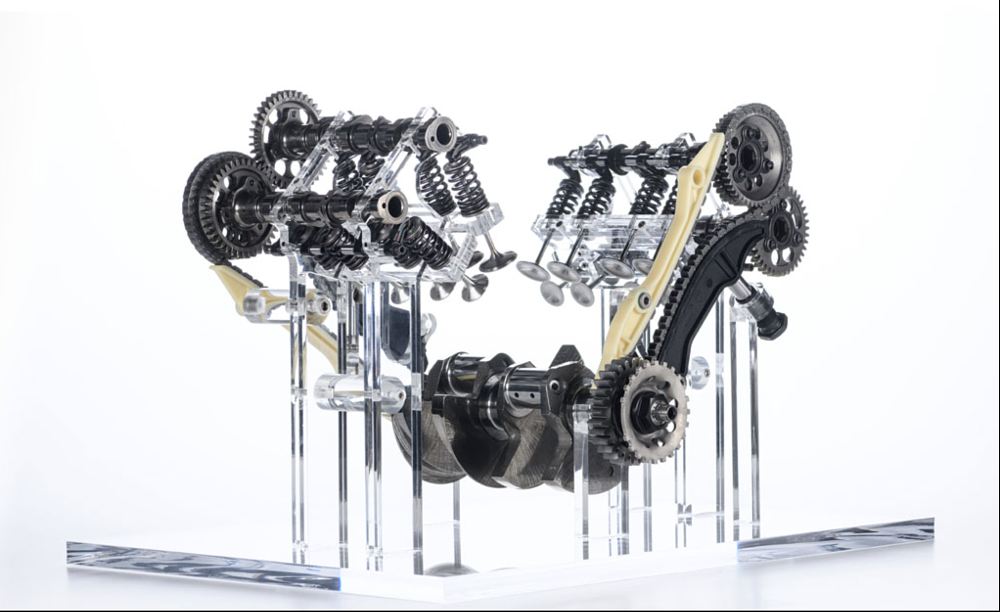
Furthering the appeal, the V4 Granturismo uses cam chains (rather than belts) that should never need replacing, and the 37,000-mile valve-service interval is bested only by the self-adjusting hydraulic system on Harley’s new Pan America. With that kind of range, you’re free to circle Earth 1.5 times before you’ll need to slide a feeler gauge into the non-Desmo, spring-return valvetrain. Oil changes are due every 9,000 miles. Remember when the chief complaints about Ducatis were price, engine heat, and frequency of service? Two out of three of those concerns have been handled. The V4 S is $26,095, after all.
That price gets you more than just a magnificent motor. The other brightly colored feathers in the Multi’s cap
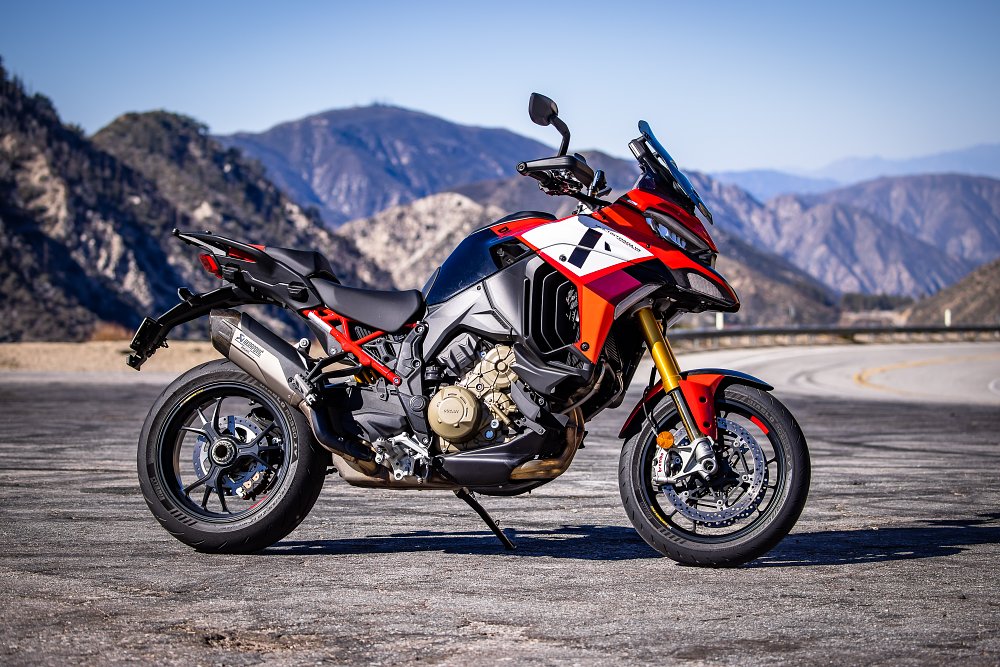
Upping the ante
Summarizing Zack’s first ride, the V4 S is a helluva bike, with performance, features, and genuinely useful tech that distinguish it from just about anything else on the market. That sets the bar mighty high for the $28,995 Pikes Peak, but Ducati assures prospective mountain slayers that this is “the sportiest Multistrada ever.”
This latest Multi ups the ante from the ground up, literally. It starts with superbike-width 17-inch wheels, forged by Marchesini and shod with Pirelli’s latest multi-compound sport rubber. The wheels cut nearly six pounds of rotating, unsprung mass off the bike’s curb weight, but more importantly they open the door to your choice of super-sticky rubber. There are pretty good tire options for the narrower 17-inch and 19-inch hoops used on the other Multi V4s, but nothing that’s going to inspire confidence at an A-group pace.
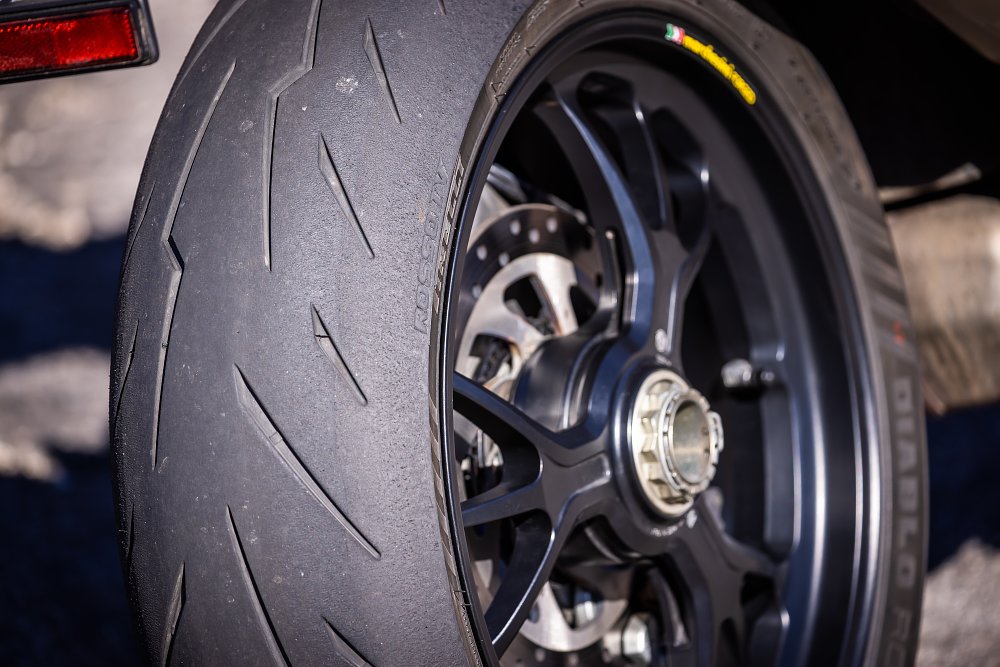
Next up, suspension. It’s still electronically controlled and adjusts itself as you ride, but the Pikes Peak gets Öhlins Smart EC 2.0 hardware in place of the Skyhook-equipped Marzocchi equipment that’s on the V4 S and V4 S Sport. Smart EC 2.0 is the same event-based suspension found on the Panigale V4 S and Streetfighter V4 S, and it's aimed at on-road performance as opposed to multi-terrain versatility and comfort.
The Pikes Peak also underwent geometry changes compared to the V4 S, and the figures are so significant that I had to check with Ducati to confirm they weren’t typos. The head angle relaxed from 24.5 degrees to 25.7, trail increased by 0.7 inches to 4.7 inches, and there’s an additional 1.1 inches between contact patches for a whopping 62.8-inch wheelbase.
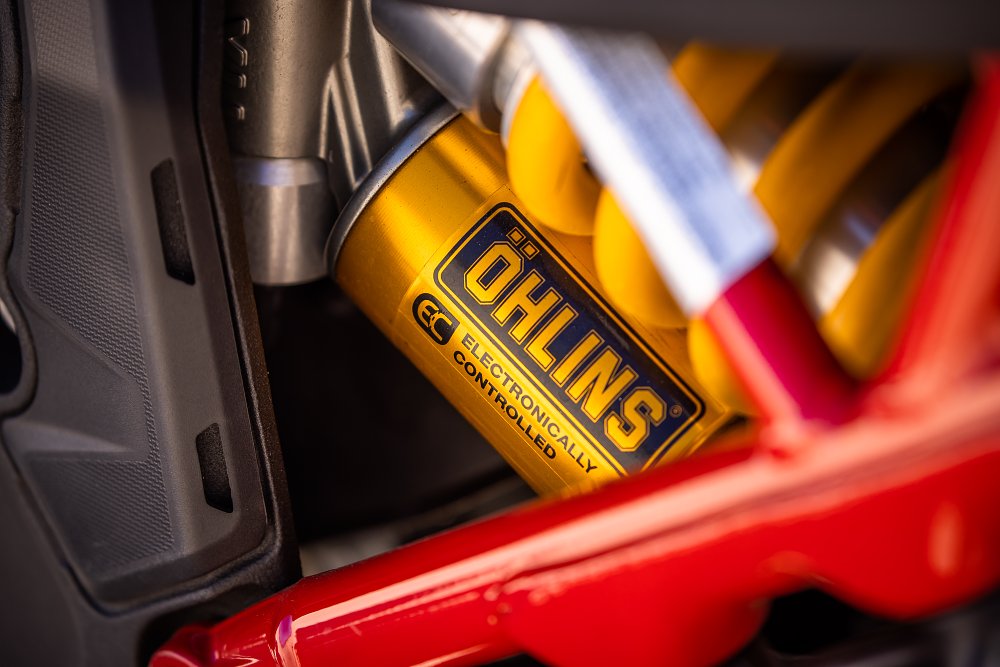
Those figures read closer to a Diavel than a Panigale, but then again, the Diavel is quite the dancer. Ducati says the changes are meant to increase high-speed stability and compensate for the size and weight difference of the 17-inch front wheel. Whatever the rationale and however it was achieved, the Multi is certainly no slouch when it comes to changing direction, and always tracks true, even when leaned over at near-triple-digit speeds.
To put the rider in a more appropriate position while strafing corners, Ducati shifted the footpegs up 10 mm and back 10 mm, and the grips are positioned 15 mm lower. Other changes include a single-sided swingarm, which serves no purpose other than offering an uninhibited view of the rear Marchesini and more closely connecting the Pikes Peak to Ducati’s famed superbikes, past and present. This model is further distinguished by racey paint with number-one plates, a two-tone seat, stubby dark-smoke windscreen, and a carbon fiber front fender and beak. Last, but not least, the Pikes Peak sports a titanium-clad Akrapovič muffler, complete with hexagonal mesh over the openings as in MotoGP.
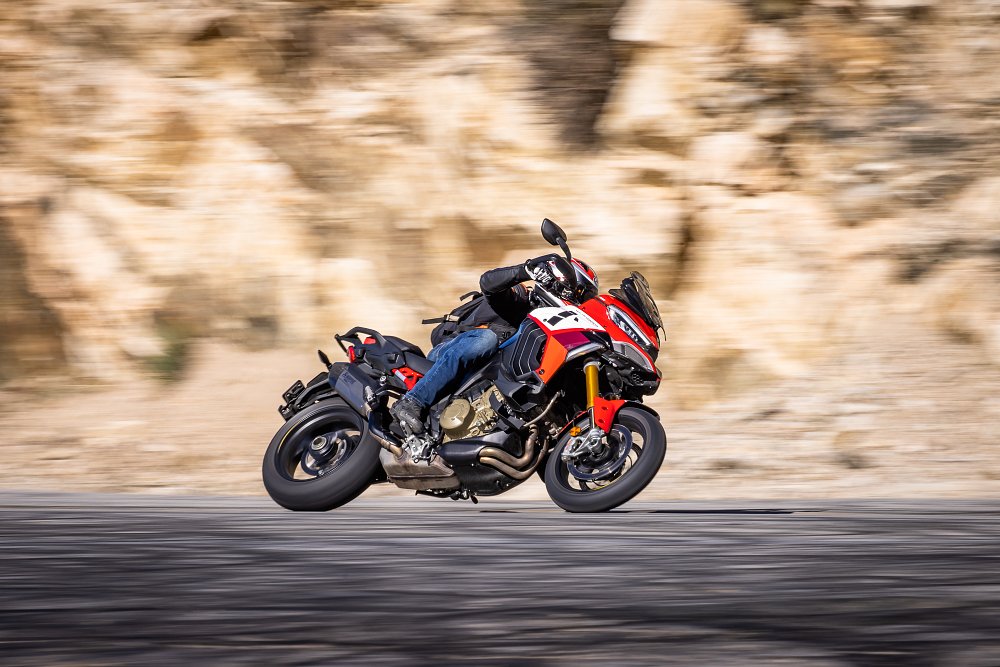
Multistrada may mean “many roads,” but all of these changes add up to a Multi that is strictly focused on the paved variety. To drive the point home, the other V4s’ “Enduro” riding mode is replaced by a “Race” mode as seen on the Panigale. That goes hand-in-hand with a softer rev limiter, more lenient wheelie control, and quickshifter mapping that permits more aggressive and rapid downshifts.
Enough with the specs, what’s it like to ride?!
The Multi’s side-mounted radiators and 5.8-gallon tank give the bike broad and muscular proportions, like an English bulldog. On most motorcycles, perceptions of size often diminish once you’re in the saddle, but the impression remains on the Ducati since there’s so much real estate ahead of your knees. Thankfully, the Multi feels neither heavy nor unwieldy, even at slow speeds with its tank full of the priciest stuff Chevron sells.
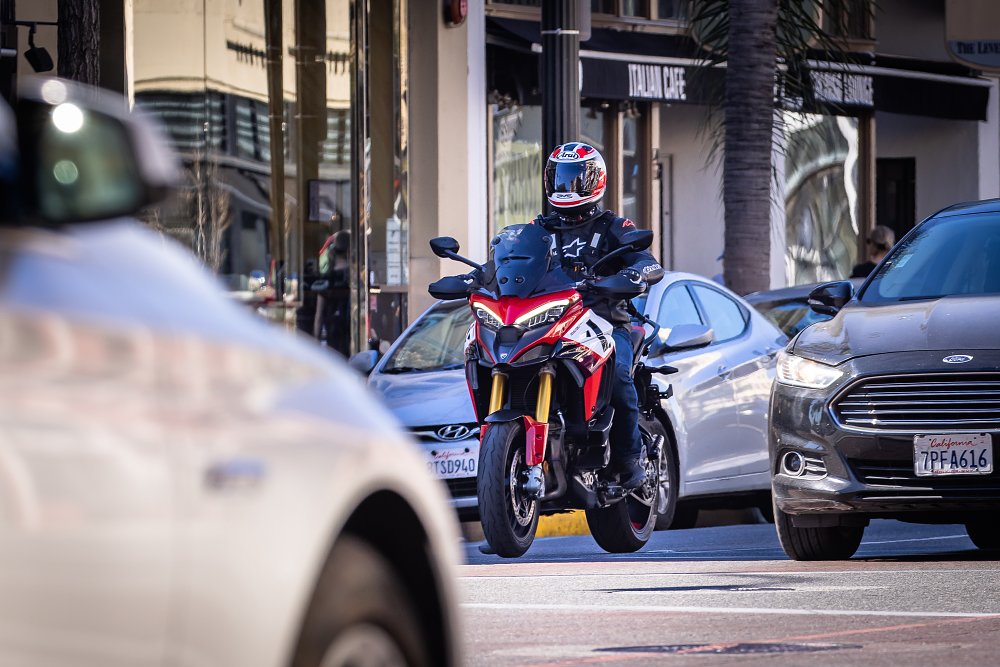
It’s quite the opposite, actually. The Multi is well balanced and agile, and is especially deft in an urban environment thanks to what appears to be a full 90 degrees of steering sweep and a light hydraulic clutch that has better feel and feedback than most. Transmission action is seamless, and the Granturismo engine is as smooth and tractable as you could ask for. You can roll away from a stop in third gear if you’re so inclined, and it’ll pull from as low as 3,000 rpm in sixth with just a slight shudder.
For as long as I can remember, Ducati’s superbike engines were lambasted for baking your backside. It was no joke — girthy header pipes and hot cylinders singed thigh meat like al pastor on a spit.
I trolled through traffic on an 85-degree day and am pleased to report that the warmth emanating from the engine and rear headers is a fraction of what riders endured on earlier V-twins. That’s thanks to many modifications, including an expansive cooling system and a nifty feature wherein the rear cylinders deactivate (stop firing, presumably by cutting fuel) at idle. You can hear the tone of the engine change when you come to a stop, and every time I do I’m reminded of Bologna’s commitment to improving the rider’s comfort. I used to dismiss the suffering as the price you pay for performance, but the Multi is amazingly athletic, and no longer a threat to skin or potential offspring.
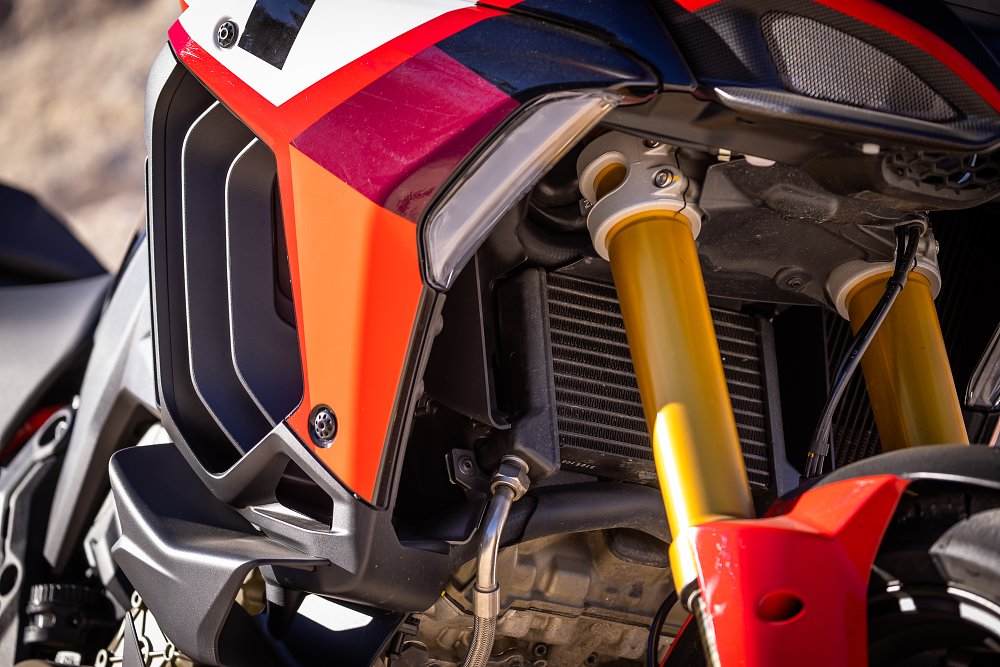
I’ve seen bigger windscreens on a Scrambler, but even still, the cockpit of the Pikes Peak is pretty calm, thanks to that bulbous upper fairing. This bike retains the excellent windscreen-adjustment mechanism used on the other models, which you simply push or pull to your desired position along three inches of travel. Since the Pikes Peak screen is so small, I barely noticed a difference in airflow with it up versus down, so I opted to leave it in the low position for better visibility.
If the Pikes Peak has a more aggressive riding position, I can’t tell. The handlebar and peg position certainly feel appropriate while slithering through corners, but the arrangement is still upright, spacious, and comfortable for droning down the highway, which the Multi is happy to do at 75 mph with the crank spinning along smoothly at 5,000 rpm. You’ll sense some vibes move through the pegs and seat as the digital tach needle sweeps past 6,000 rpm, but at that point you’re either approaching triple-digit cruising speeds or on your way to the kind of acceleration that makes vibrations, and everything else except what’s ahead of you, a very minor concern.
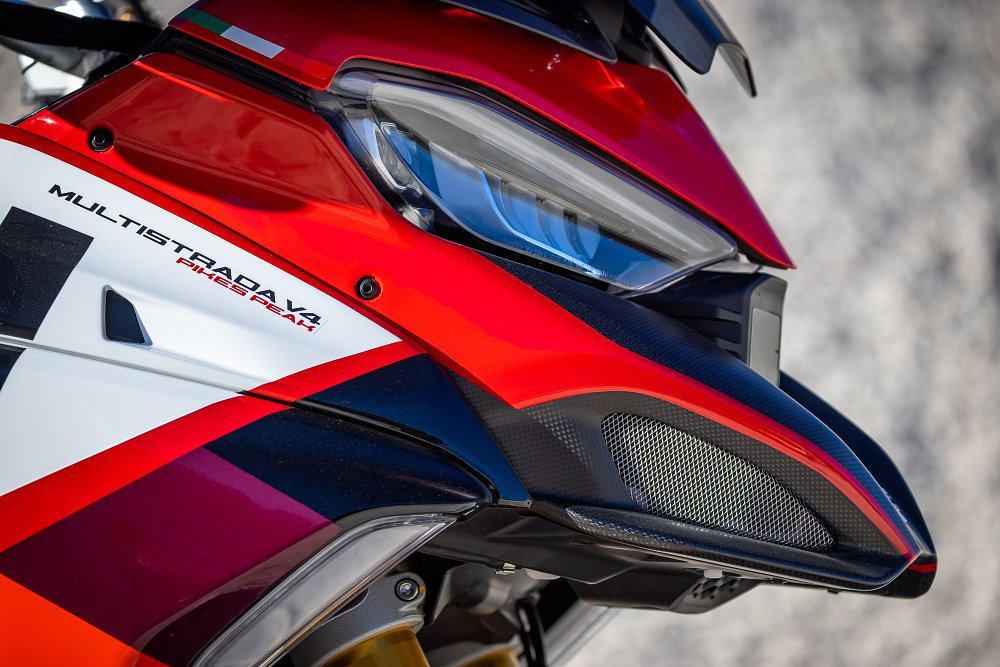
That snazzy Akrapovič pipe offers more in the aesthetics department than the acoustics department, which is to say it looks awesome but is pretty quiet. Don’t expect the sound of distant thunder when you start the bike, but you can look forward to a satisfying intake roar when you open the throttle, along with stomach-tingling acceleration and an almost guaranteed wheelie in first or second gear. This bike leaps forward with authority, and keeps accelerating hard up to, and beyond, 140 mph.
Heading up the hill
Riding up the 156 turns of Pikes Peak to the 14,155-foot summit is certainly on my bucket list, but February is a tough time of year in the Rockies. It’s spring in Southern California though, and we have our own famous mountain roads, including Mulholland Highway and Latigo Canyon in the Santa Monica Mountains and the Angeles Crest Highway in the San Gabriel Mountains, all of which I thoroughly enjoyed on the Multi.
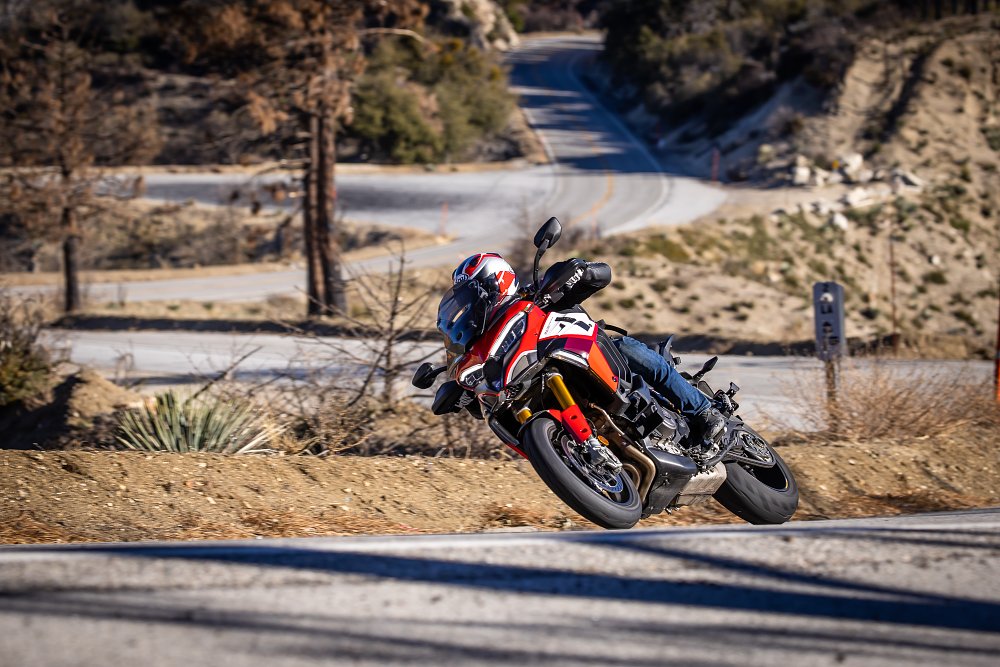
This bike really comes into its own on a twisty road, with the kind of relaxed riding position and quick-transition behavior we all love about tall ADVs, backed up with suspension and grip that can support the most aggressive maneuvers. Even at a pace that worked up a sweat on a chilly mountain morning, it was clear I was only scratching the surface of what this bike is capable of. Like BMW’s S 1000 XR, you’ll need to sign up for a track day to really put the Pikes Peak through its paces.
A lot of credit is due to the Öhlins suspension. It feels several steps firmer than the Skyhook hardware, in terms of spring rates and damping schedules. Skyhook also uses an entirely different strategy, extrapolating a fixed point in the sky above the bike and referencing that to adjust damping and maintain a level chassis. The Öhlins Smart EC 2.0 system looks at the rider’s control inputs and bike data (including IMU info) to determine how to adjust damping, which in my mind is a better approach for managing a bike that’s being flung through apexes, i.e. rarely in a vertical position.
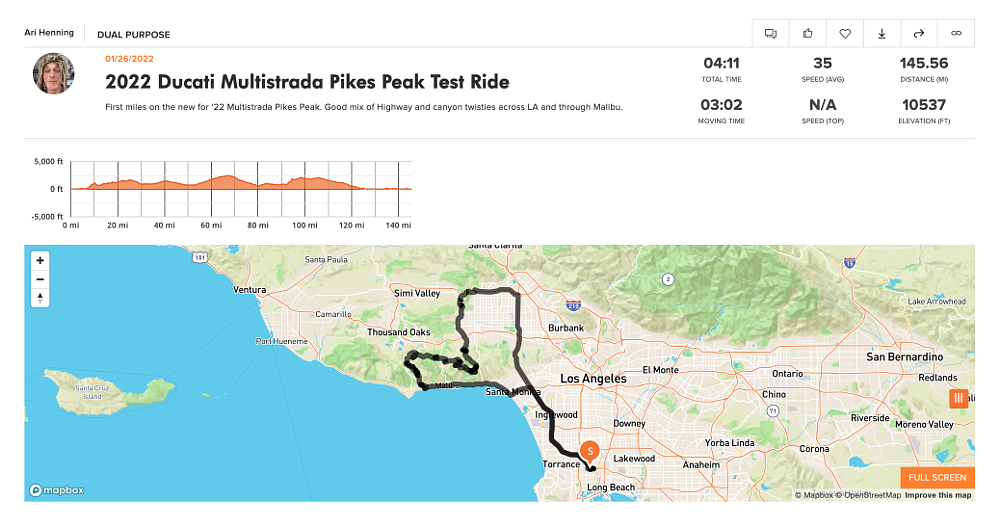
Even if the Öhlins on the Pikes Peak is firmer, the system is still broadly adjustable. You can run the shock through 7.5 mm of preload with the push of a button, and there are five damping settings to choose from including Hardest, Hard, Medium, Soft, and Softest.
In Softest, with rear preload pulled all the way out, the Multi is Cadillac cushy. Each step up the damping ladder yields a noticeable difference, all the way up to what I would call Superpole stiff. I experimented with all of them and found Soft to be ideal for commuting and Medium (in combination with the rider/luggage preload setting) to be an excellent compromise for riding fast on not-so-smooth mountain roads.
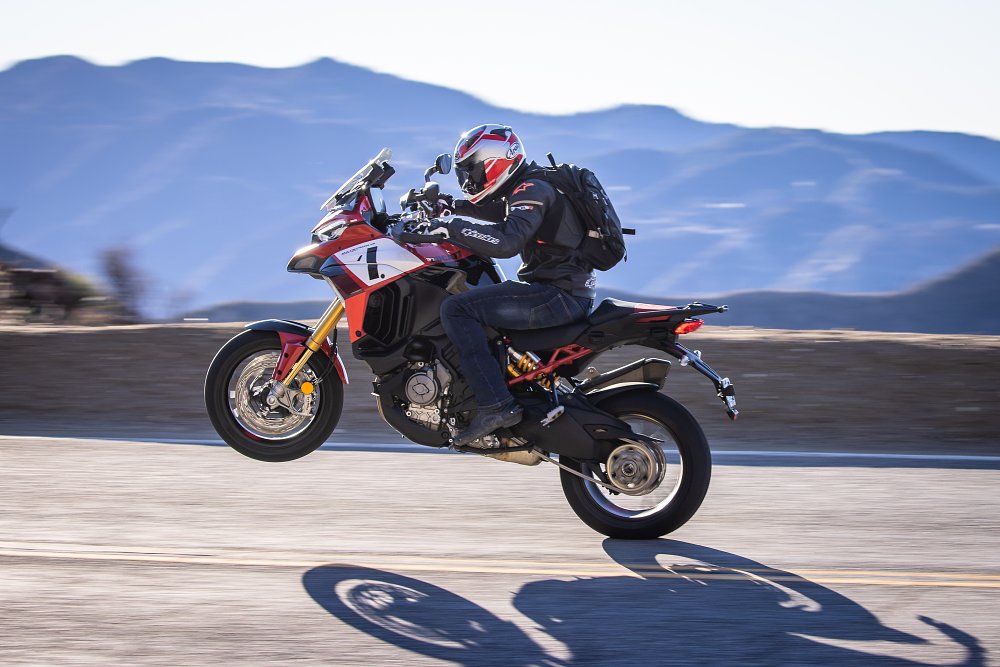
Braking power from the Panigale-spec Brembos is great, though there’s more idle stroke at the lever than I prefer. Quickshifter action is superb, throttle response is precise, and there are slick electronics in place to help keep you safe when you overwhelm the tires, which isn’t easy to do.
In summary, this is a helluva bike. It forfeits the other models’ off-road intentions and replaces them with a heaping pile of sport performance, which is a compromise some people will be happy to make.
So, what’s not to like?
If it sounds like I’ve been hooked up to a Ducati Kool-Aid IV, I understand. It’s been pretty rosy thus far. The fact is this is the fourth generation of Multistrada, and Ducati has been improving the formula for 20 years, so there aren’t a lot of stones left unturned. Plus, riding the Pikes Peak is as effective a mood enhancer as a shot of espresso.
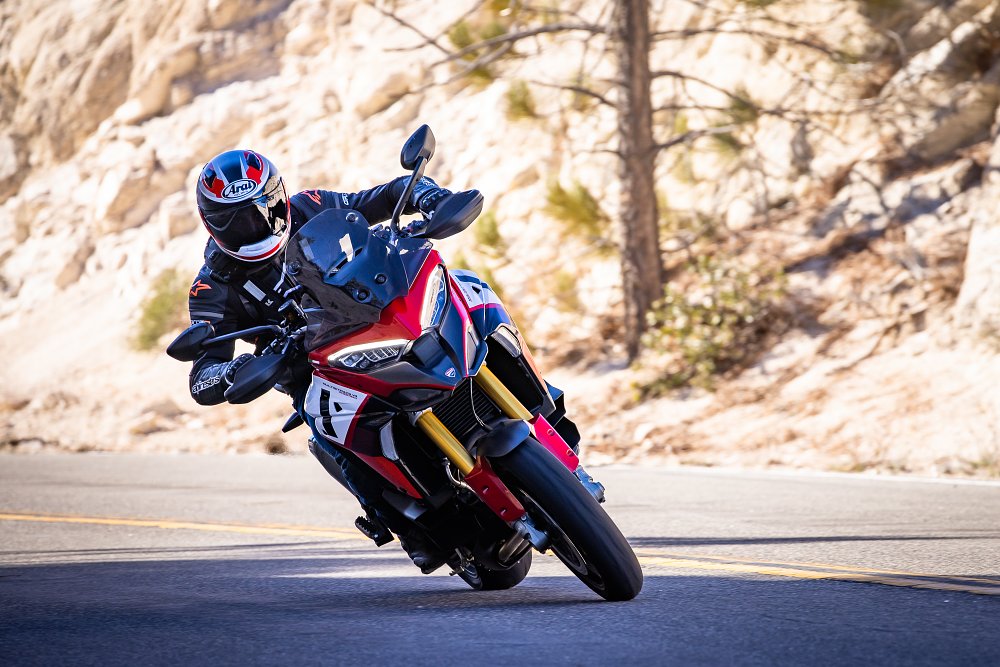
However, there are some things that are tough to swallow, and we might as well start with the one that will make the V4 Multistrada Pikes Peak a nonstarter for most: The price. $28,995 is an expenditure reserved for the well to do, or at least those who aren't intimidated by a hefty monthly payment. If you’ve got the money to work with, then good for you, the Multistrada Pikes Peak is sure to bring you a lot of enjoyment, no matter how you decide to ride it.
Next up on my list is heated grips, or lack thereof. They’re included on the V4 S, and the Pikes Peak has the appropriate button on the left cluster, but pushing it doesn’t do anything until you fork over $388 for a set of heating elements.
Fuel range is another smudge on the Multi’s suit. I averaged 32.2 mpg over the course of several tanks of gas, with 36 mpg as a high and 29 mpg as a low. That means you’ll likely get about 175 miles range, which is 25 shy of the 200-mile benchmark I’ve set for any bike with touring intentions. The Pikes Peak could potentially get a pass based on its intended purpose, but all the Multis have the same 5.8-gallon capacity.
Zack discussed the Adaptive Cruise Control at length in his V4 S article, and overall I’m a big fan of ACC since it reliably maintains your choice of four following distances and will even brake if someone invades your road space. It’s surprisingly well integrated, too, allowing you to shift up or down, with or without the clutch, without deactivating.
And yet, if you tailor your riding modes to enjoy the Multi fully, that is if you turn off either rear ABS, TC, or wheelie control, that also disables radar, which deactivates cruise control and BSD, since they’re all intrinsically linked. You can still turn ACC on, but it won’t accept a set speed, so make sure you have at least one riding mode set up with all the safety nets in place so you can toggle over to it when you want to use cruise control.
As far as BSD is concerned, I found it worked reliably for vehicles overtaking you, but if you pass a car slowly it’s possible to have the vehicle out of view in your periphery and in the mirror and not have the amber BSD warning light at the edge of the mirror illuminate. Those are rare instances, but it bears reiterating what Ducati is quick to point out, which is that BSD is a rider aid, not a replacement for spatial awareness and defensive riding.
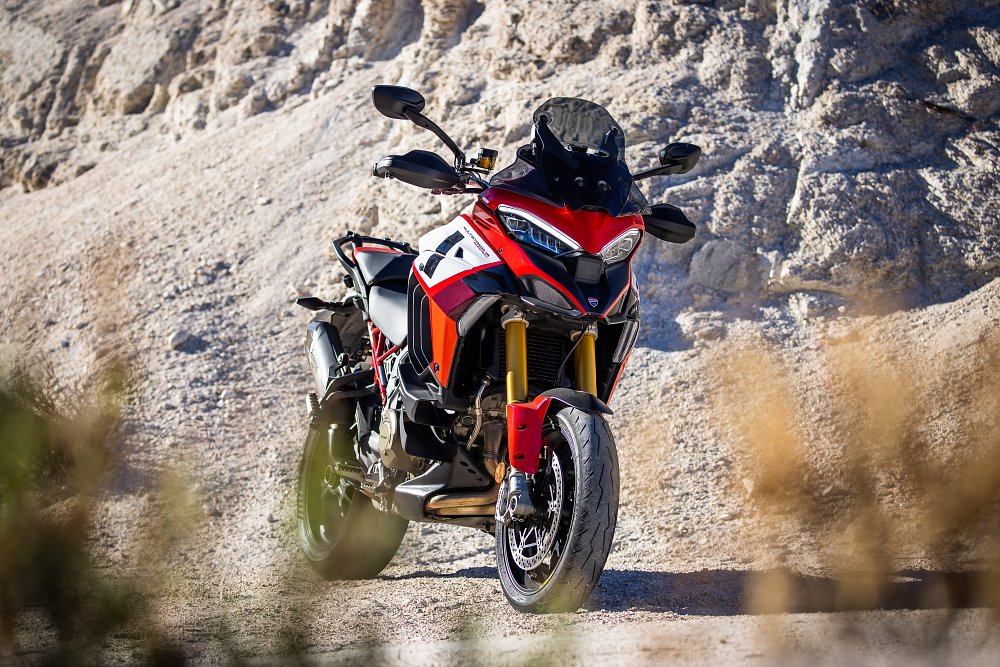
On the topic of software, I didn’t even try to use the Ducati Connect service in the dash. Zack has far greater interest and patience with software than I do, and even he was frustrated with the hoops he had to jump through to get it to work. Read his assessment if you want to know the details, but suffice to say you’re better off using your preferred navigation app on your phone and piping it through your Bluetooth headset.
Finally, I’d like to see a manual, static option for the Öhlins suspension, since dynamic adjustment can sometimes be distracting at the track.
Final thoughts
Ducati’s superbike engines have evolved from long-stroke, low-revving torque monsters in the 1098 and 1198 days, to short-stroke, high-revving, high-horsepower track tools during the Superquadro Panigale era. The V-four architecture, and the specific tuning of the Grandturismo engine, melds the two characteristics into one broadly powerful engine. This might be Ducati’s best engine to date, and the Pikes Peak might be the best way to enjoy it.
What Impresses me most about the Multi isn’t just how aggressive a sport bike it can be, but how fantastic a street bike it still is. It’ll shuttle you to and from work in total comfort without losing an iota of sporting excitement, and with the push of a few buttons it transforms into a long-legged superbike worthy of its name and the number-one plate on its flanks.
“The sportiest Multistrada ever” is right, and not just by a slim margin.
| 2022 Ducati Multistrada V4 Pikes Peak | |
|---|---|
| Price (MSRP) | $28,995 |
| Engine | 1,158 cc, liquid-cooled, 16-valve, V-four |
|
Transmission, final drive |
Six-speed, chain |
| Claimed horsepower | 170 @ 10,500 rpm |
| Claimed torque | 92 foot-pounds @ 8,750 rpm |
| Frame | Aluminum monocoque |
| Front suspension | Öhlins 48 mm fork, electronically adjustable compression and rebound damping; 6.7 inches (170 mm) of travel |
| Rear suspension | Öhlins shock, electronically adjustable for spring preload, compression and rebound damping; 6.1 inches (170 mm) of travel |
| Front brake | Brembo Stylema four-piston calipers, 330 mm discs with ABS |
| Rear brake | Brembo two-piston caliper, 265 mm disc with ABS |
| Rake, trail | 25.7 degrees, 4.7 inches (120.0 mm) |
| Wheelbase | 62.8 inches (1,595 mm) |
| Seat height | 33.1/33.9 inches (840/860 mm) |
| Fuel capacity | 5.8 gallons |
| Tires |
Pirelli Diablo Rosso IV 120/70ZR17 front, 190/55ZR17 rear
|
| Measured weight | 543 pounds |
| Available | Now |
| Warranty | 24 months |
| More info | ducati.com |





